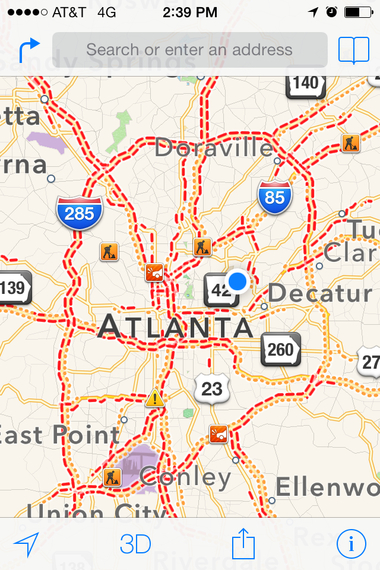Around 1 p.m. on Tuesday, it started to snow heavily in Atlanta. Snowpocalypse 2014 began to unfold. At the time, I was at work at Emory University, where I am a professor. My wife was 20 miles northeast, at her office in John's Creek, and my two teenage kids were 15 miles southwest, near the Atlanta Airport, where they both go to high school. We were all trying to get home and to each other (at the same time as the rest of Atlanta's 5 million residents) while the streets began to clog and ice over.
Although my kids quickly got into a minor fender-bender, they were fine, and the car was too, so overall, we were fortunate on that account. But like many other commuters, it took us 21 hours to get home. I used to live in Boston, so I understand how those who are used to snowfall are astounded at how an inch or two of snow could be such a disaster for a major American city. The main reason is a lack of preparedness and experience. Without preparing the streets with sand or salt, the snow quickly melted and refroze into ice. Without closing schools and businesses, everyone was caught unaware and trying to find their children and make their way home simultaneously. And the consequences were disastrous.
As I tried to get home on secondary streets, the road ahead was virtually a parking lot. Distances that normally take minutes took hours. The road I was on, like many in Atlanta, goes up and down hills, and going up hills was starting to get harder as it got dark and the roads began to ice up. I called my kids again, realizing that they should not attempt this route, and told them to pull over in to a parking lot and wait for me. I would come and get them. It was now around 5:30. I was stuck on a hill, and almost out of gas. My wife was stuck on I-285 and had barely moved in three hours. I was maybe five miles away from them, but it would take me another three and half hours to get to my kids.
More than once there was a car stuck on the ice trying to make it up a hill in front of me, and I had to stop. When I got out and started to push the young lady's car, she opened her window and told me, "You're the best!" I said, "You better wait until I actually get you out of this mess." My feet were slipping on the hill, which was like an ice rink, and I couldn't get any traction to push her. Then a truck with about eight immigrant construction workers pulled up, and they all got out and started to push her up the road. After that, they pushed me, and I got up the hill.
As I finally pulled up to the Waffle House to find my stranded teenage kids, the president was starting his State of the Union speech on NPR, and it struck me how in times of crisis, all of us Americans pull together, forgetting about race, religion, or political party. Around 12:30 a.m., at a dead stop and going nowhere, I checked Facebook on my phone, and a friend of mine was telling everyone how he had several people staying at his house, and everyone should take in a stranger and give them a warm bed. His partner was driving around town rescuing people in his 4-wheel drive SUV, with gas and food and a tow. People not far from us were opening their homes to dozens of students and strangers who were stranded at their schools with no parents able to retrieve them. Their example was restoring my faith in human nature. We were fortunate to have another friend close by who quickly offered us beds for the night. In five minutes we were there, refugees from Snowpocalypse 2014, exhausted but safe.
In the morning, unshowered, unshaven and having slept in my clothes, we crossed a bridge over I-285 to view a sea of mostly 18-wheelers, completely stopped as far as the eye could see. Hundreds of commuters and truckers, much less fortunate than us, spent the night on the expressways, some running out of gas, others in accidents, others just stuck behind uncountable cars and trucks. I heard tales of people walking up and down the expressway bringing food and drink to those who were stranded. One of the patients from my wife's practice ended up giving birth to her baby in a car stuck on that highway. Fortunately, both mother and baby are fine.
Over and over again, with crisis after crisis, whether it is a terrorist attack like 9/11, a tornado in Moore, Oklahoma, a hurricane such as Superstorm Sandy, or insane traffic on streets of ice that hit Atlanta, we are reminded of our common bonds as citizens and as human beings -- and of the basic goodness in human nature and concern for our fellow man. If only we (and our elected representatives) could remember that the other 99.9 percent of the time.
Around 11:30 a.m., just as we got close to our driveway, which is on a hill, a pickup truck was trying to tow another truck up the hill, and once again I was offered more help from a stranger as the driver urged us not to go down the hill. "There's a bunch of cars stuck down there. You'll never get out."
"No worries," I told him. "We're home."

